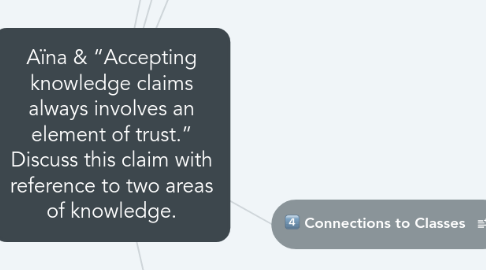
1. Keywords
1.1. knowledge
1.1.1. understanding about something, awareness, information
1.2. always
1.2.1. no exception, entirely, all the time, in any case
1.3. trust
1.3.1. faith, belief, certainty, reliance
1.4. accepting
1.4.1. you believe
2. Key Phrases
2.1. knowledge claims
2.1.1. a statement that the knower believes to be true yet is up to debate as to assess the veracity of the statement.
2.2. trust
2.2.1. relationship between two parties that requires a firm belief in the reliability, truth, or ability of someone or something.
2.3. accepting knowledge claims
2.4. element of trust
3. Rewrite
3.1. In order to accept information as truth, a person must have a firm belief in the source of that information.
4. Connections to Classes
4.1. History
4.1.1. History
4.1.2. Accepting knowledge claims always involves trust.
4.1.2.1. China's cultural revolution where Mao burned any evidence of Capitalism in order to teach a certain version of history that was believed by the whole of China, based on their trust in the government.
4.1.2.1.1. TOK concept
4.1.2.1.2. Historical development
4.1.3. Accepting knowledge claims doesn't always require trust when there are universal facts.
4.1.3.1. Hiroshima Atomic Bomb happened on the 6 August 1945 and people accept this fact without acknowledging the person sharing the knowledge.
4.1.3.1.1. TOK concept
4.1.3.1.2. methodology
4.1.3.2. add certainty into claim
4.1.3.3. trust as an element of surprise
4.1.3.4. fake news
4.1.3.4.1. some knowledge left out
4.2. Physics
4.2.1. Natural Science
4.2.2. Our trust in the knowledge producer limits the objective acquiring of knowledge.
4.2.2.1. My trust in my physics teacher and my trust in his knowledge makes me sometimes blindly accept facts or statements when they may be wrong. For instance, he taught us the concept of the wave function squared, but when drawing the graph, he drew the wave function graph. My trust in his knowledge made me accept this graph as fact. Instead, I should have looked at this graph objectively and seen that it was impossible to have a negative square value.
4.2.2.1.1. TOK concept
4.2.2.1.2. PK
4.2.3. Accepting knowledge also requires an analysis of the evidence.
4.2.3.1. Einstein's theory of relativity that contradicted most laws, making scientists at the time carefully go through the evidence in order to accept new physics laws (quantum physics).
4.2.3.1.1. TOK concept
4.2.3.1.2. Methodology
5. Rewrite
5.1. History
5.1.1. the production of knowledge in History is a combination of subjective interpretations and facts, making trust necessary in some cases (regarding specific narrative). Yet, it is unnecessary when recording facts.
5.2. Physics
5.2.1. the acquisition of knowledge in Physics is based on a scientific analysis of the facts and the use of an objective lens.
5.2.2. The production of knowledge in Physics doesn't require trust because the subject is based on scientific evidence. (unique to AOK)
5.2.3. empirical evidence

